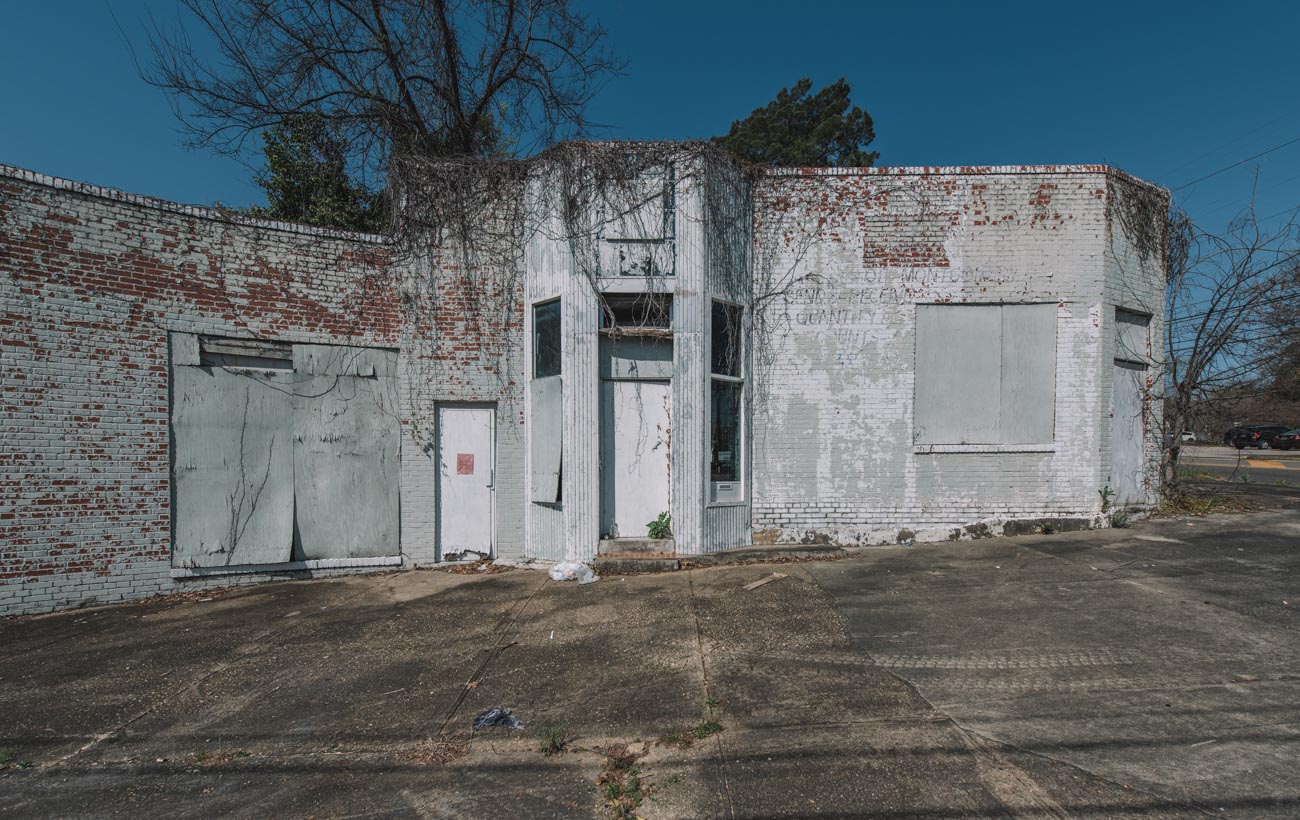| City/Town: • Montgomery |
| Location Class: • Commercial |
| Built: • 1945 | Abandoned: • 2015 |
| Status: • Demolished |
| Photojournalist: • David Bulit |
Table of Contents
The Tan-Kar Oil Company was founded in 1928 by Moses Wadsworth Stuart Sr. along with his business partner Isaac Fred Solomon who was bought out in the late-1930s. M. W. Stuart was a businessman who made his fortune as a real estate developer, flipping homes before building homes in the Peacock Tract subdivision in Montgomery before moving on to much larger projects such as the construction of the Hotel Dexter and the conversion of Knox Hall into apartments. He also owned the first local automobile dealerships for Ford and the Hapmobile, although these business ventures were short-lived.
Tan-Kar Red Devil
The first Tan-Kar Oil service station was located near Maxwell Air Force Base which Stuart called the “Red Devil”, and got a statue of a red devil and a loudspeaker and went about the city shouting, “Red devil! Red devil!” After the construction of the Red Devil station just north of Reese Ferry Bridge on Highway 31, Stuart received a letter from Standard Oil’s John D. Rockefeller threatening to run him and Tan-Kar Oil out of business. He responded by expanding the station on Highway 31 into a recreation park known as Red Devil Lake. Opening on June 16, 1934, the park featured a lake, a pavilion where they served barbecue daily, a bathhouse, a 50-foot-high slide, and a restaurant located on the lake’s dam. Free admission to Red Devil Lake was also offered to those who purchased five gallons from any Tan-Kar Red Devil filling station. In 1938, a massive flood destroyed the lake’s dam, washing away many of the structures within the recreation park. The Tan-Kar filling station remained but the rest of the property was reused for other purposes.
Throughout many of his business ventures, he took his sons to help operate and manage them, eventually making them equal partners. The eldest of three sons, Moses Wadsworth Stuart Jr. was born on September 14, 1903. He attended the University of Alabama for two years before dropping out in the 1920s to help his father with his lumber and house-building business where he worked for about eight years. In January 1929, he and his father started Stuart Insurance Agency, an insurance and real estate business. Through the agency, they rented out apartments at the Winter Apartments and Martha Stuart Apartments which were owned by M. W. Stuart Sr. Within a decade, Stuart Jr. wholly owned the agency and continued operating it until his retirement in the 1960s.

World War II
By 1940, Stuart bought out his business partner I. Fred Solomon and took on his youngest sons, Edgar and Hugh, as equal partners of the Tan-Kar Oil Company. It was during this time that the service station on the corner of South Decatur and High Streets was built, and was listed as the company’s main office for many years. On December 8, 1941, the United States declared war on Japan following the attack on Pearl Harbor. This declaration led to a massive number of volunteers and an even larger number of draftees joining the U.S. military. Hugh Stuart was drafted into the United States Marine Corps and Edgar soon followed by joining the United States Army. Hugh ended up serving in the South and Central Pacific aboard the USS Sante Fe and the USS Birmingham. He participated in the landing support, bombardment, and invasions of Guadal Canal, Iwo Jima, Ie Shima, and Okinawa Islands. He also assisted with the covering force in the air bombardment of Tokyo. In their absence, Moses W. Stuart Jr. operated the Tan-Kar Oil Company.
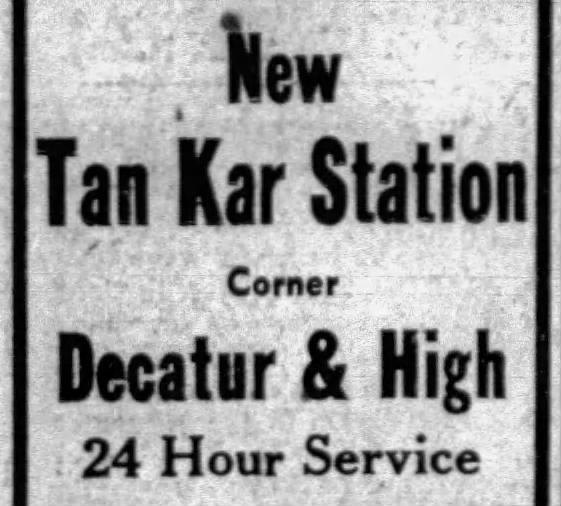
Tire Rationing
During World War II, the federal government established a rationing system in order to conserve crucial supplies needed for the war effort. Due to Japanese control of rubber producing nations such as Malaya and the Dutch East Indies and the ability to import rubber from South America was not an option as cargo ships were used for military purposes, the rationing of rubber became of utmost importance to the war effort.
Tires were the first product to be rationed starting in January 1942, just a few weeks after the Japanese attack on Pearl Harbor. Local rationing boards issued certificates for new tires which were reserved for essential services such as healthcare, fire, and police personnel, mail and garbage trucks, and public transportation. Most consumers could no longer purchase new tires and could only have their existing tires patched or have the treads replaced. Good, functional tires became so valuable it was recommended that one keep records of their tires’ serial numbers in case they were ever stolen. That same month, new automobiles could no longer be purchased as car manufacturers converted their factories to produce jeeps, tanks, bombs, torpedoes, and various other munitions. Just as it had been with tires, car theft had become a prevalent problem that the average consumer had to deal with.
Gasoline Rationing
On November 26, 1942, the federal government announced that gasoline would be rationed starting December 1, 1942. Motorists were issued ration cards displaying a letter that told gas station attendants how much gasoline one was allowed to purchase. With the card came a book of coupons which allowed the driver and the gasoline attendant to keep track of the amount of gasoline purchased. Along with the card, windshield stickers were also issued with the letter they were issued. The most common letter was “A” which allowed the car owner to purchase 3 gallons of gas each week. Factory workers who shared rides with 3 or more passengers were issued “B” cards and were allowed 8 gallons of gas each week. Physicians, mail carriers, and clergy were issued “C” cards that also allowed up to 8 gallons of gas per week. Some services and professions were deemed too important and were given permission to purchase unlimited amounts of gasoline. These included emergency vehicles that were issued “E” cards, farm vehicles that were issued “R” cards, and Congressional members and VIPs who were issued the controversial “X” cards.
Despite rationing, a serious gas shortage developed in early 1944. Very little gasoline was available on the West Coast and no gasoline was found in some parts of the nation. On March 22, 1944, “A” class drivers were further restricted to just 2 gallons of gas per week. These restrictions allowed the black market to become quite profitable as cases of gas siphoning increased and ration card forgery rings operated throughout the country.
In an open letter to The Montgomery Advertiser, Edgar Stuart wrote: “Black market operations in gasoline have become a very serious problem. Each day the service station operator is approached by some old customer or friends and is sometimes complete strangers who are trying to get gasoline illegally. The person who is attempting to do this may be a very prominent man in his community, a lady of high principles, or a man that has served in this war. In most instances, they have very close relatives now serving their country. These people have not awakened to the fact that they are hindering our progress toward victory.”
He continues further down saying, “The gasoline industry has been very seriously affected due to rationing, and other hardships and regulations necessary in time of war…” Despite what Stuart wrote, Tan-Kar Oil Company was soon found to have violated rationing regulations by selling gasoline to those with forged ration coupons as well as those using coupons that were not assigned to their vehicle, and operations were suspended for 20 days.
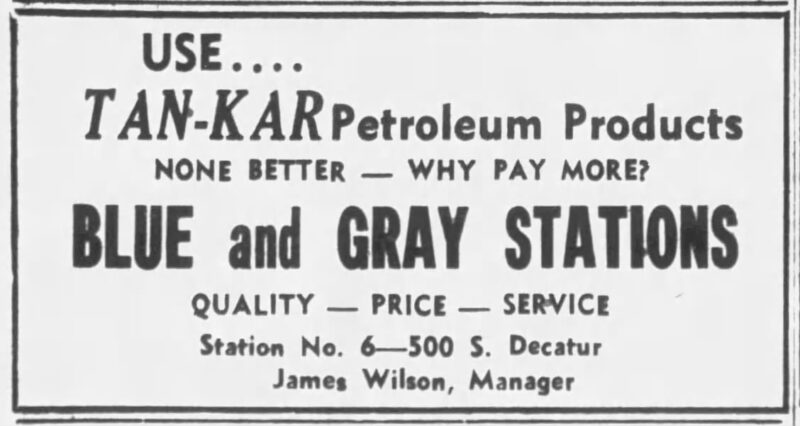
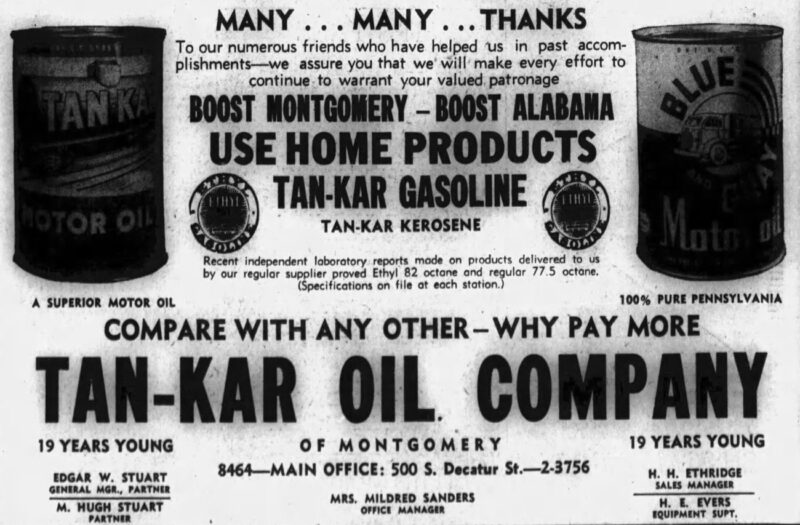
Rebranding and expansion
Following the war, Hugh was discharged from the Marines after two years of service and returned to Montgomery. With the likelihood of Edgar’s discharge happening soon, Hugh announced an expansion of the Tan-Kar Oil Company to celebrate their sixth year in business together. The Stuart brothers rebranded many of their “Red Devil” stations as “Blue and Gray” stations, hoping to further the popularity of the Blue and Gray Game, an annual college football game developed by Champ Pickens and began in 1939. All of the stations were also painted blue and gray.
This station on South Decatur Street was also one of three stations that offered quick and efficient oil changes by using an oil extractor and inserting a tube into the top of the engine. Their newest stations operated 24 hours 7 days a week, offering car washes and oil changes all day long. It was advertised as the “Two-Man Service” which involved one attendant pumping the gas while the other checked the tires, oil, water, battery, and gas tank cap for any loose gaskets. They also cleaned the rear and front windshields, taillights and headlights, and side mirrors. Throughout these years, Tan-Kar experienced steady growth, on average adding a new service station every 36 months. By the 1960s, there were eighteen Tan-Kar service stations scattered throughout the city and located as far as Selma.
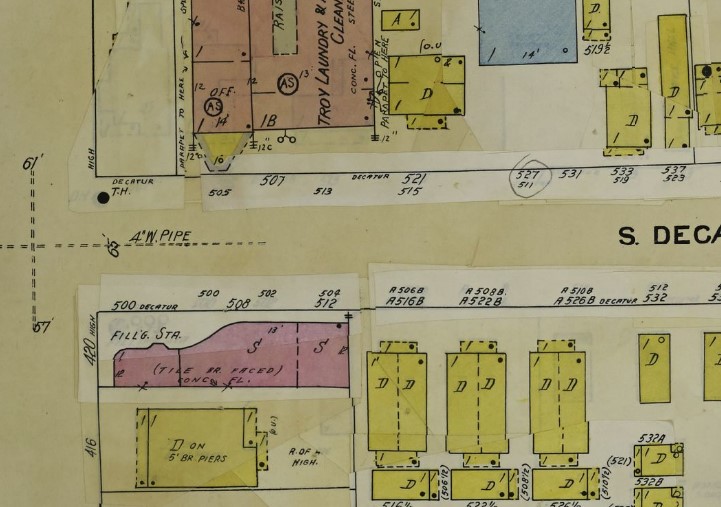
Decline
Newer, more modern stations began popping up around the city in the late-1960s, forcing many independent stations to lower their gas prices in order to compete. Violent crime in Montgomery was also on the rise as many Tan-Kar service stations experienced robberies on a regular basis. In one instance, the night attendant of a Tan-Kar station on Atlanta Highway was followed into the back room where he was beaten, bound, and robbed of his billfold containing $268. In another instance, thieves robbed a station on Pike Road by prying open a side door and taking cigarettes, tools, and a shotgun.
Edgar Wall Stuart died on April 8, 1991. He was born July 11, 1916, and attended Washington and Lee University in Lexington, Virginia. During his life, he was president of the Junior Chamber of Commerce, the Chamber of Commerce, and the Kiwanis Club; he was a Director of the Coosa-Alabama River Improvement Association; he served as a Board member of the Children’s Center, served on the Board of Directors of City Federal Savings and Loan; he was also an Elder in the First Presbyterian Church. Matthew Hugh Stuart was born July 30, 1913, and attended the University of Alabama. In 1951, he founded the Peach State Oil Company in Atlanta, Georgia, although it was nowhere near as successful as Tan-Kar Oil. He died on July 19, 1999.
By the time of their deaths, the service stations had all been replaced, shut down, or reused. The station on South Decatur was purchased by Labsouth Inc. in 1998 and used as a clinical laboratory. It was later operated by Labcorp until its closure in 2015. On March 4, 2022, the Code Enforcement Department issued an “unsafe structure” notice giving the current owner thirty days to make repairs or demolish the building. Repairs were never made and the building was demolished in November 2022.
Photo Gallery
References
Sarah Sundin. (July 17, 2017). Gasoline Rationing in World War II
Sarah Sundin. (January 5, 2022). Tire Rationing in World War II
Edgar Stuart, The Montgomery Advertiser. (January 6, 1944). Black Market in Gasoline
The Montgomery Advertiser. (May 4, 1944). OPA Sentences Stayed Against 5 Oil Firms
The Montgomery Advertiser. (December 23, 1945). Gas Stations Renamed For Blue-Gray Game
The Montgomery Advertiser. (January 31, 1949). Quick Oil Change Saves You Time
The Montgomery Advertiser. (October 27, 1945). Stuart Brothers Plan Expansion
The Montgomery Advertiser. (April 15, 1971). Bandit Leaves Victim Bound
The Montgomery Advertiser. (June 6, 1973). Service Station Burglars Take $250 in Items

